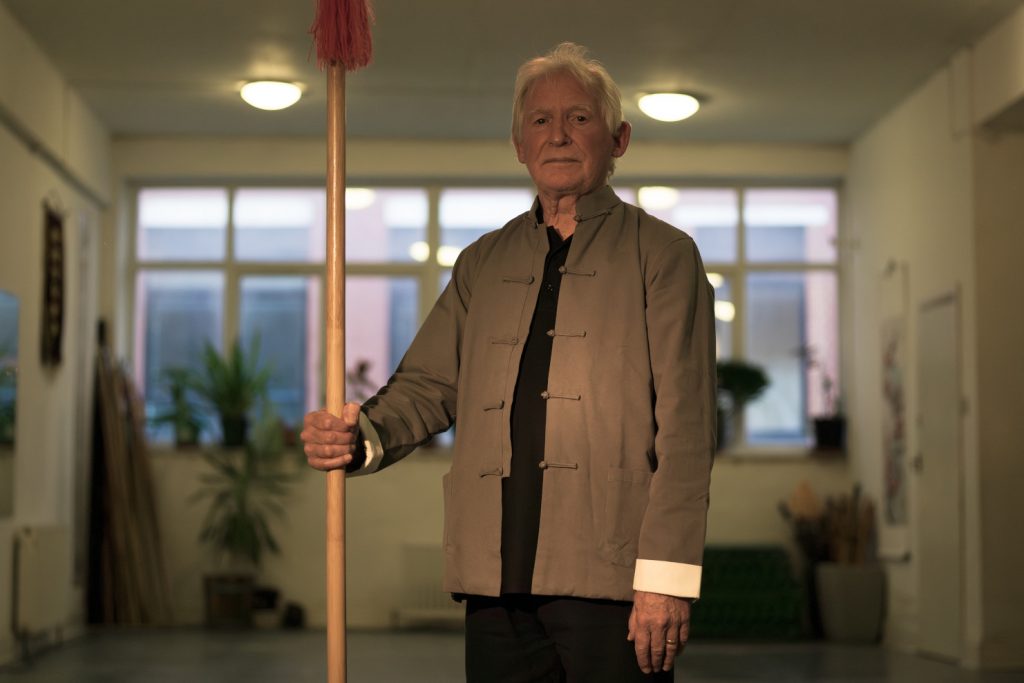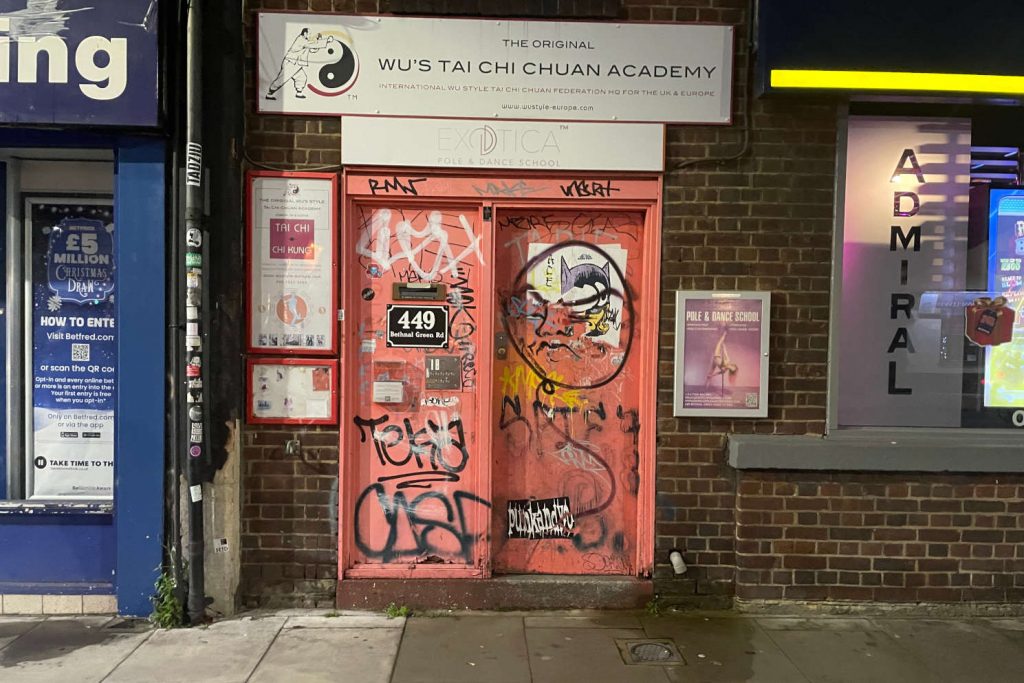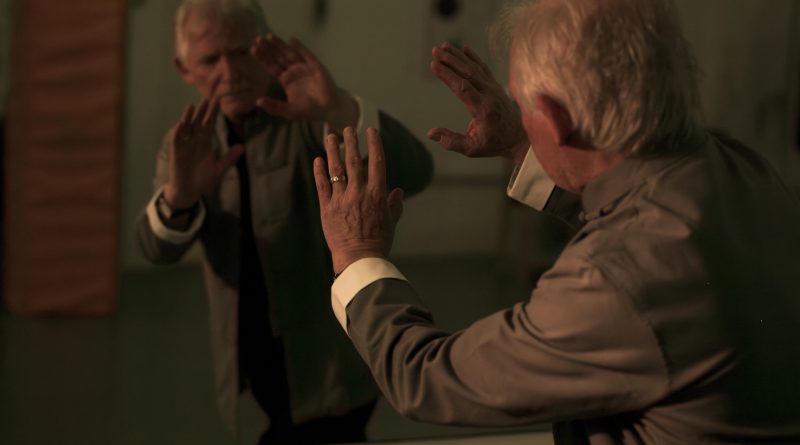Behind the orange doors: Tai Chi master Gary Wragg
How intuitive connections have brought Tai Chi Stifu and world champion Gary Wragg to an unassuming studio in Bethnal Green and why he thinks world leaders should be pushing hands.
The heavily graffitied orange door to Gary Wragg’s Tai Chi studio is visibly ajar yet needs a hefty push to access the fluorescent-lit hallway inside. Following the lino steps up two floors, past the pole dancing studio, Wragg meets me at his door wearing a subtly embossed black silk robe tied around the waist.
Both Wragg and the space have a distinct air of serenity and seriousness. We walk silently through the main room lined with a mirrored wall and tapestries embroidered with pinyin TaiChi, the language of Tai Chi, into his office where he’s brewed some loose-leaf calendula tea.
For the last 18 years, jazz guitarists, award-winning pianists and dance choreographers have all come through the orange door to centre themselves and restore a sense of balance. The Tai Chi classes run every evening and during the day on the weekends, for beginners to seniors.
A Stifu, meaning master, Wragg has practised Tai Chi for over fifty years, and won many competitions. He is recognised as one of Europe’s leading experts in Martial Arts and many of his students have gone on to win championships.
Wu Style Tai Chi is one of the five styles of Tai Chi, and the fourth oldest. It was the art used by Wu Chien Chuan, of the Imperial Guard, to protect the Chinese Emperor.

Wragg held the position of Chairman of the Tai Chi Union for Great Britain twice and is currently the Chairman of the International Taiji & Qigong Federation. In 1991 and 1993 Wragg was the Canadian Push Hands Champion and at the 2000 British Open, he won a silver medal in the Spear competition.
Throughout our conversation, Wragg did not mention, or even endeavour to reference one of these accolades.
Wragg first arrived in Bethnal Green in 2003 when he set up an art studio on Viner Street. He describes this road as the place to be for artists.
‘I loved it there, I could go over to Victoria Park and practice Tai Chi – Viner Street was fantastic.’
The link between Wragg’s art and his Tai Chi practice is spiritual and these two passions were tied together by an invisible string pulling him towards Bethnal Green. It was also tied to a thread of family history. His family lived in Bethnal Green before WWII. Fleeing the blitz his parents and sisters moved to High Wickam before he was born. His wife, who passed away nine years ago, also grew up in Bethnal Green and her father was president of the London Boys Club.
Wragg first encountered Tai Chi while working as an art professor at Slade Arts School in 1973. At this point in time he was interested in sketching the human form.
‘One of the students said ‘We’re going to a Tai Chi class would you like to come? And I said No.’
Wragg laughs and says he asked his students if he could come to the next class to observe and draw.
‘Gradually my paintings came to be about understanding tactical value and touch which is a very important part of Tai Chi, but I knew nothing about Tai Chi between the years of 1963 and 1973 when this shift toward abstraction happened for me.’
‘The teacher was talking about ‘Dao’ and at the time I was doing these abstract paintings – and the movements she was explaining were exactly what I was exploring in my paintings and it just clicked.’
Wragg explains that Dao is the energy centre at the heart of the Tai Chi practice, ‘It’s the no way of nature, not the way, the no way, and the idea is just to see what happens.’
In 2003 when British Land bought his studio in Great Portland Street, he said ‘I will leave it to the Dao.’ It was then that he spotted the orange door on Bethnal Green Road.
‘I used to get the tube to my studio in Bethnal Green and sometimes I would walk down Bethnal Green Road to get my art supplies and I noticed this orange door.’
Surprised, I asked him if it was always the same colour as it is now “The same colour yes, it’s always been orange it’s a bit graffitied at the moment but I don’t mind that.”
Wragg made a couple of calls and it turned out that the orange doors he had been walking past were home to an empty studio space, which would become his new academy.
He said, ‘It worked out beautifully.’ This year will be the studio’s 18th anniversary.
‘When I first moved here the two local pubs were the Sun and the Moon [now the Bethnal Green Tavern and The Sun Tavern], and the sun and the moon is yin and yang, a core idea in Tai Chi’.
Wragg tells me of yet another synchronicity, or what he calls ‘intuitive connection’, in the form of a self-portrait he painted almost a decade before he discovered Tai Chi.
‘In the painting, I was standing with my feet slightly apart, and it was in the very first posture of Wu Style Tai Chi Tong, called Tundra. The other interesting thing is in most styles of Tai Chi the feet are parallel – and it’s very specific but in Wu Style, the feet are slightly apart. And that’s exactly how I was standing. I still have that painting and I will never part with it.’

Tai Chi includes the practice of pushing hands, which involves two people making contact through the hands. Although this can be high energy, and violent, Wragg’s emphasis is on understanding someone else’s energy, he adds that ‘those who don’t have sensitivity skills will just use brute force.’
Telling me about what he would like to see for the planet’s future, he fantasises about gathering world leaders into one room for pushing hands.
He imagines how the conversation might go.
‘Let’s just do some pushing hands – you don’t have to have wars. I’ll show you how to actually enjoy interacting with other people, it’s much better, you do not have to kill people. The world is in such a state at the moment – it’s awful.
‘I would love to do that – but of course, they would refuse because of the power they have- and so they don’t.’
Tai Chi is how Wragg sees the world and moves through it: ‘I find myself saying a lot less.’
He also so he’s changed how he walks. ‘When I was an art teacher, I used to let my head lead me as I walked.’
Wragg gets up to demonstrate a slumped, depressive walk, led by the head, with his eyes on the floor.
‘I see this all the time, I see it on this street, people are walking with someone else’s style, in their heads.’
But in a small studio behind an orange door in Bethnal Green, Wragg is helping the next generation of Tai Chi students to hold their heads up and create intuitive connections with the world.
If you enjoyed this, you may also like to read about Eleanor Crow’s shopfront paintings.

